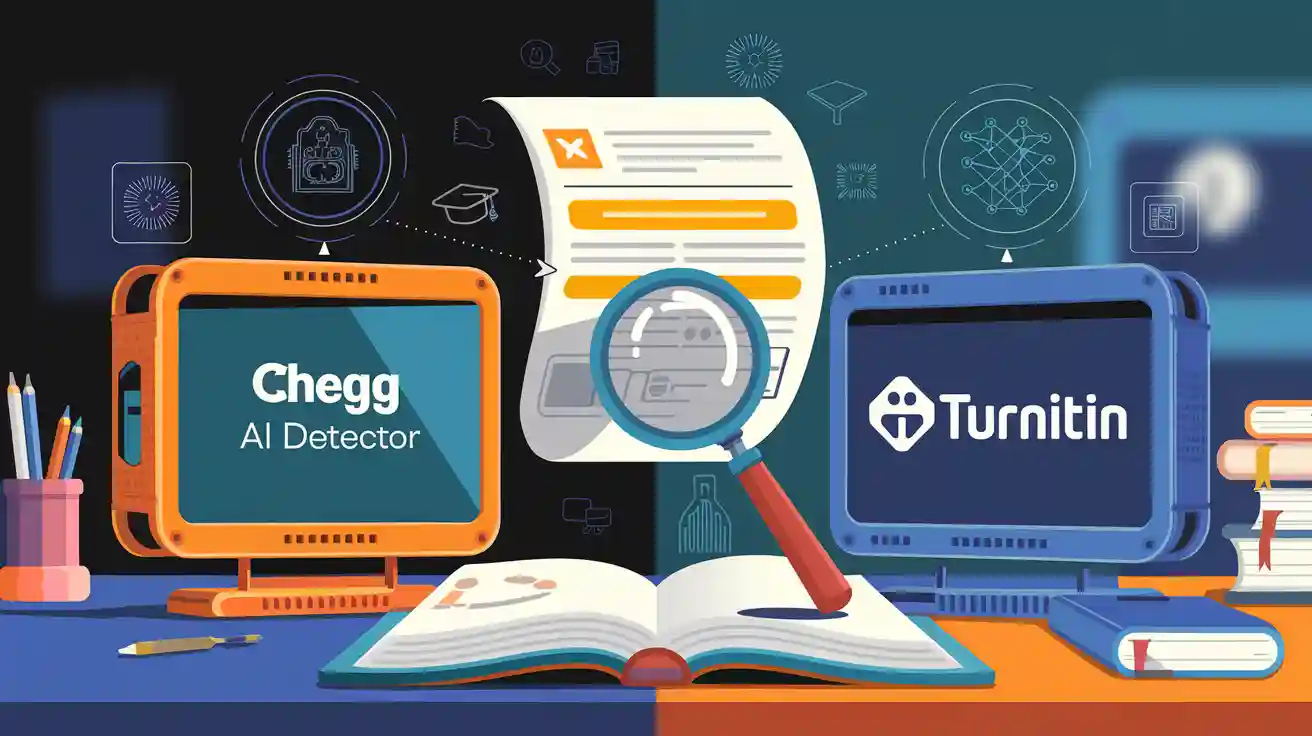
You want a tool that catches both plagiarism and AI writing. Turnitin stands out as the better choice. Chegg ai detector often misses AI-generated content, especially when the text sounds human. Chegg sometimes flags sentences that are not AI, so you might get false alarms. Turnitin gives you stronger results for plagiarism and AI detection. Chegg works for basic checks, but Turnitin handles more advanced cases. You see better accuracy and reliability with Turnitin, making it the top pick for most users.
Key Takeaways
-
Turnitin offers more accurate AI and plagiarism detection than Chegg, making it the best choice for academic work.
-
Chegg provides a fast, easy-to-use plagiarism checker ideal for individual students needing quick feedback.
-
Turnitin supports educators and institutions with advanced features like grading, feedback, and LMS integration.
-
Chegg is affordable and accessible for personal use, but it lacks detailed reports and deep database coverage.
-
For schools and colleges, Turnitin’s strong integration and detailed analysis help maintain academic integrity.
Accuracy

AI Detection
When you want to check if a text was written by AI, you need a tool that gives you clear and accurate results. Chegg AI Detector tries to spot AI writing, but it often struggles with accuracy. You might notice that it misses some AI-generated content, especially if the writing sounds natural. Sometimes, it even marks human writing as AI, which can be confusing.
Turnitin uses advanced AI detection technology. You get a much higher level of accuracy with Turnitin. The system analyzes sentence structure, word choice, and writing patterns. This helps you find AI-generated content more reliably. Turnitin’s AI detection works well with both short and long texts. You can trust the results because Turnitin updates its algorithms often to keep up with new AI writing tools.
Tip: If you need to check for AI-generated content in academic work, Turnitin offers a more reliable solution than Chegg AI Detector.
Here is a quick accuracy comparison for AI detection:
|
Tool |
AI Detection Accuracy |
False Positives |
Updates |
|---|---|---|---|
|
Chegg AI Detector |
Low to Moderate |
High |
Rare |
|
Turnitin |
High |
Low |
Frequent |
You see that Turnitin leads in accuracy and reliability. Chegg AI Detector may work for basic checks, but it cannot match Turnitin’s advanced capabilities.
Plagiarism
Plagiarism detection is a key feature for both tools, but you will notice big differences in performance. Chegg AI Detector checks your text against a limited database. This means it might miss some sources or fail to catch subtle plagiarism. You may not get a detailed report, so you could overlook important issues.
Turnitin stands out as one of the most reliable plagiarism detection tools. It scans your work against a massive database of academic papers, websites, and publications. You get a detailed originality report that highlights every match. Turnitin’s advanced plagiarism detection finds even small instances of copied text. You can review the report and fix any problems before you submit your work.
If you want an effective online plagiarism detector, Turnitin gives you the best results. The accuracy of Turnitin’s plagiarism detection is unmatched. You can rely on it for academic, professional, or personal use.
Note: Turnitin’s advanced plagiarism detection and AI detection make it the top choice for anyone who values accuracy and originality.
Features
Chegg Plagiarism Checker
You want a plagiarism checker that is easy to use and fast. Chegg plagiarism checker gives you a simple interface. You can upload your document and get results in seconds. This tool works well if you need a quick plagiarism check for homework or personal projects. Chegg focuses on individual users, so you do not need to sign up for an institution or connect to a learning management system.
Chegg plagiarism checker checks your text against a basic database. You get a straightforward report that highlights possible plagiarism. However, you will not see detailed similarity reports or advanced analytics. Chegg does not offer grading or feedback tools. You cannot customize the plagiarism checker or connect it to other platforms. If you want a tool for basic plagiarism detection, Chegg can help. But you may miss out on features that support academic integrity at a higher level.
Note: Chegg plagiarism checker works best for students who want a fast, independent plagiarism checker without extra features.
Turnitin
Turnitin stands out as a comprehensive plagiarism checker for schools, colleges, and universities. You can use Turnitin to check for plagiarism, manage grading, and give feedback all in one place. Turnitin connects with popular learning management systems, so you can use it with platforms like Blackboard and Moodle.
Turnitin checks your work against a massive database of academic papers, websites, and publications. You receive detailed similarity reports that show every match and possible issue. Turnitin also offers advanced analytics and customization. You can set up grading rubrics, share feedback, and track student progress. Recent updates include better accessibility, improved highlight colors, and new tools for transparency in the writing process.
If you want a plagiarism checker that supports originality and academic workflows, Turnitin gives you the most complete solution. You get regular updates and new features that keep Turnitin ahead of other tools like Chegg plagiarism checker.
|
Feature Aspect |
Chegg Plagiarism Checker |
Turnitin |
|---|---|---|
|
User Interface |
User-friendly, simple, designed for individual users |
More complex, integrated with educational platforms |
|
Primary Focus |
Quick and efficient plagiarism detection |
Comprehensive platform including plagiarism, grading, feedback |
|
Integration |
Standalone tool, no LMS integration |
Widely integrated with LMS like Blackboard and Moodle |
|
Target Users |
Individual users |
Educational institutions and instructors |
|
Efficiency |
Fast results, straightforward |
In-depth analysis with detailed similarity reports |
|
Additional Features |
Limited to plagiarism detection |
Includes grading, feedback, and educational ecosystem |
User Experience
Interface
When you use a tool to check for copied work, you want a simple and clear interface. Chegg gives you a user-friendly design. You see large buttons and easy instructions. Many students like Chegg because you can upload your document quickly. You do not need to search for hidden features. Chegg shows your results in a way that is easy to understand. You can spot problems in your writing right away.
Turnitin also offers a user-friendly experience, but it feels more advanced. You see more options on the dashboard. Teachers and students can both use Turnitin, but some students may need time to learn all the features. Turnitin gives you detailed reports, which help you check for copied work in depth. If you want a tool that does more than just basic checks, Turnitin gives you extra tools for feedback and grading.
Tip: If you want a quick and user-friendly tool, Chegg works well. If you need more features, Turnitin gives you more control.
Accessibility
You want a tool that works for everyone. Chegg makes it easy for students to access the plagiarism checker from any device. You can use Chegg on your phone, tablet, or computer. This helps students who need to check their work on the go. Chegg does not require special software, so you can start right away.
Turnitin also supports many devices. Schools and colleges often use Turnitin because it connects with learning platforms. Students can submit assignments directly from their school accounts. Turnitin offers features for students with disabilities, like screen reader support and clear text. This makes Turnitin a good choice for all students.
|
Tool |
User-Friendly |
Mobile Access |
Accessibility Features |
|---|---|---|---|
|
Chegg |
Yes |
Yes |
Basic |
|
Turnitin |
Yes |
Yes |
Advanced |
Both Chegg and Turnitin help students succeed. You can choose Chegg for a fast, user-friendly experience or Turnitin for more advanced support.
Integration
LMS Compatibility
You want your plagiarism or AI detection tool to work smoothly with your school’s learning management system (LMS). This makes your workflow easier and saves you time. Turnitin leads in LMS compatibility. You can connect Turnitin with popular platforms like Canvas, Blackboard, Moodle, and Google Classroom. When you submit assignments, Turnitin checks your work automatically. Teachers can review reports without leaving the LMS. This seamless connection helps you stay organized and keeps your assignments in one place.
Chegg does not offer direct LMS integration. You need to copy and paste your text or upload files on the Chegg website. This extra step can slow you down, especially if you work with many assignments. Chegg works best as a standalone tool for quick checks, not as part of a larger school system.
Tip: If your school uses an LMS, Turnitin gives you a smoother experience. You do not need to switch between different platforms.
Here’s a quick comparison:
|
Tool |
LMS Integration |
Supported Platforms |
|---|---|---|
|
Chegg |
No |
None |
|
Turnitin |
Yes |
Canvas, Blackboard, Moodle, more |
API Options
APIs help you connect tools to other software. If you want to build custom solutions or automate tasks, you need strong API support. Turnitin offers robust API options. You can use these APIs to link Turnitin with your school’s systems or other apps. This helps IT teams and educators create custom workflows. You can automate plagiarism checks, manage reports, and pull data for analysis.
Chegg does not provide public APIs for its plagiarism checker or AI detector. You cannot connect Chegg to other tools or automate your workflow. This limits Chegg’s use for schools or tech-savvy users.
Note: Turnitin’s API options give you more flexibility. You can build the system that fits your needs.
If you want easy integration and automation, Turnitin stands out. Chegg works for simple, individual checks, but Turnitin supports advanced school and institutional needs.
Cost
Pricing
You want to know how much these tools cost before you choose one. Chegg offers a simple pricing model. You can use the basic plagiarism checker for free. If you want more features, you can buy the Writing Pack. This pack costs about $10 per month. It adds grammar checking and writing help. You pay for Chegg as an individual user. You do not need to join a school or institution.
Turnitin uses a different approach. You cannot buy Turnitin as an individual. Schools and colleges pay for Turnitin. The cost is about $3 per student each year. This price gives you access to advanced plagiarism detection and detailed reports. You get strong support for academic work. Turnitin does not offer a personal plan. You need to use it through your school or teacher.
Note: Chegg works well if you want a personal plagiarism checker. Turnitin fits best for schools and large groups.
Free vs Paid
You may wonder what you get for free and what you need to pay for. Chegg gives you a quick and efficient plagiarism check at no cost. You can upload your text and see basic results. The free version does not show a similarity index or detailed originality report. You also get fewer customization options and less accurate results.
Turnitin does not have a free version for individuals. You must access it through your school or instructor. When you use Turnitin, you get a full plagiarism checker with advanced features. You see detailed reports and high accuracy. Schools can customize Turnitin to fit their needs.
|
Feature / Aspect |
Chegg Free Version |
Turnitin Free Version / Access |
|---|---|---|
|
Accessibility |
Available to anyone who signs up; easy to use |
No free version; only accessible via institutional licenses requiring school/instructor credentials |
|
Plagiarism Check |
Basic plagiarism check by inputting text or uploading files |
Highly accurate plagiarism detection with extensive database coverage |
|
Detailed Reports |
Does not provide Similarity index or Originality report |
Provides detailed Similarity index and Originality report |
|
Customization Options |
Limited customization; fewer personalization options |
Tailored to academic institutions with advanced customization |
|
Accuracy and Algorithm Quality |
Less sophisticated algorithms; less accuracy |
Advanced algorithms and extensive databases for reliable detection |
|
Additional Features in Paid Version |
Writing Pack includes grammar checking and writing assistance (~$10) |
Institutional cost approx. $3 per student annually; no individual paid version |
|
Limitations |
Limited database coverage; fewer features and reports |
Requires institutional affiliation; not individually accessible |
You see that Chegg gives you easy access and a basic plagiarism checker. Turnitin offers a professional plagiarism solution for schools. Your choice depends on your needs and how you plan to use the tool.
Suitability
Students
You want a tool that helps you check your writing for mistakes and possible plagiarism. Chegg gives you a fast and simple way to review your work before you turn it in. Many students use Chegg to catch grammar errors and basic plagiarism. You can use Chegg on your own, which makes it easy to fit into your study routine. If you need quick feedback on your writing, Chegg works well for homework or personal projects. You do not need to join a school system to use it. Chegg is affordable, so you can get help without spending too much. However, Chegg may not catch every issue, especially in academic settings where rules are strict. If you want to avoid potential instances of academic misconduct, you should use a tool that checks more deeply.
Educators
As a teacher, you want to support your students and keep academic standards high. Turnitin gives you advanced tools to check for plagiarism and help students improve their writing. You can use Turnitin to give feedback, run peer reviews, and even grade assignments. Many educators prefer Turnitin because it connects with academic integrity platforms like Moodle and Blackboard. You save time and help students learn better. Chegg offers basic checks, but it does not have the educational features you need for classroom use. Educators notice that Chegg sometimes misses subtle plagiarism, which can lead to academic misconduct. Turnitin’s detailed reports and educational tools make it a better choice for teaching and learning.
Teachers say Turnitin helps them find and address academic issues quickly. Chegg is good for simple checks, but Turnitin supports deeper learning.
Institutions
Schools and colleges need strong academic integrity platforms to protect their reputation. Turnitin stands out for institutions because it offers deep integration with learning systems and supports large groups of students. You can track writing trends, spot potential problems, and keep academic standards high. Turnitin’s educational features help you train both students and staff. Chegg works best for individual students, not for whole schools. Institutions need a tool that finds all types of plagiarism and supports educational goals. Turnitin gives you the power to manage academic integrity and prevent misconduct across your campus.
If you want to protect your institution from academic risks, Turnitin is the best choice. Chegg is helpful for students, but Turnitin meets the needs of academic institutions.
Turnitin vs Chegg
Use Cases
You want to choose the right tool for your needs. Turnitin and Chegg work best in different situations. Turnitin fits schools, colleges, and educators who need strong tools to spot copied work and support academic integrity. You can use Turnitin to check for copied work in essays, research papers, and assignments. Teachers rely on Turnitin to give feedback, grade work, and run peer reviews. If you work in an institution, Turnitin helps you manage many students and keep high standards.
Chegg works well for individual students and writers. You might use Chegg when you need a quick and easy way to check for copied work before you submit homework or a personal project. Chegg gives you grammar help and basic plagiarism checks. If you study on your own or write outside of school, Chegg offers a simple solution. You do not need to join a school system or pay for an expensive subscription.
If you want to check for copied work in a classroom or manage many assignments, Turnitin gives you more features. If you need a fast check for your own writing, Chegg is easy to use.
Here is a table that shows the main use cases for each tool:
|
Use Case |
Turnitin |
Chegg |
|---|---|---|
|
Academic assignments |
✔️ Strong support for schools and colleges |
✔️ Basic checks for students |
|
Institutional integrity |
✔️ Yes |
❌ No |
|
Individual homework/projects |
✔️ Through school access |
✔️ Direct access for individuals |
|
Feedback and grading |
✔️ Advanced tools |
❌ Not available |
|
Grammar checking |
❌ Limited |
✔️ Included in writing pack |
|
Peer review |
✔️ Yes |
❌ No |
|
AI detection |
✔️ Advanced |
✔️ Basic |
Pros and Cons
You need to know the strengths and weaknesses of each tool before you decide. Turnitin vs Chegg is a common question for students and teachers. Both tools help you check for copied work, but they offer different benefits.
Turnitin Pros:
-
Advanced plagiarism and AI detection. You can trust Turnitin to find even small cases of copied text.
-
Large database. Turnitin checks your work against essays, journals, books, and web pages.
-
Educational features. You get feedback tools, peer reviews, and automated grading.
-
Seamless integration. Turnitin connects with learning platforms like Moodle and Blackboard.
-
Strong tools to spot copied work in academic settings.
Turnitin Cons:
-
Higher cost. You usually need an institutional subscription.
-
Hard for individuals to access. You cannot buy Turnitin on your own.
Chegg Pros:
-
Affordable. Chegg costs less and offers individual plans.
-
Easy to use. You can start checking your work right away.
-
Grammar correction included. Chegg helps you improve your writing.
-
Quick and easy way to check for copied work before you submit.
Chegg Cons:
-
Smaller database. Chegg may miss some sources when you check for copied work.
-
Basic detection. Chegg sometimes misses subtle plagiarism or AI writing.
-
Limited features for educators. Chegg does not support grading or peer review.
Tip: If you need to check for copied work in a school or college, Turnitin gives you more power and accuracy. If you want a simple tool for personal use, Chegg is a good choice.
Here is a summary table based on recent expert analysis:
|
Aspect |
Turnitin |
Chegg |
|---|---|---|
|
Technology & Accuracy |
Advanced plagiarism detection algorithms; high sensitivity; misses fewer cases |
Basic text matching; lower sensitivity; misses about 1 in 1000 unintentional plagiarism cases |
|
Database Size |
Vast database including essays, journals, books, and web pages |
Smaller database limiting detection depth |
|
Educational Features |
Feedback tools, peer reviews, automated grading; supports educators and institutions |
Focuses mainly on plagiarism checking; grammar correction included; limited educator support |
|
Integration |
Seamless integration with learning platforms (Moodle, Blackboard); customizable for institutions |
Simple setup; minimal integration with educational systems; targets individual users |
|
Cost |
Starts at $18.95/month; mainly institutional subscriptions; individual access limited |
$9.95/month; individual user plans; more affordable but less comprehensive |
|
Target Audience |
Schools, colleges, educators, institutions |
Individual students and writers |
|
Accessibility |
Primarily institutional; individual access is difficult |
Easy individual access with free trial; suitable for solo use |
|
Strengths |
Thorough academic integrity enforcement; extensive features for education |
Budget-friendly; user-friendly interface; basic plagiarism and grammar checking |
|
Limitations |
Higher cost; less accessible to individuals |
Smaller database; less sensitive detection; lacks advanced academic tools |
You see that Turnitin gives you more features and better accuracy, especially for academic work. Chegg offers a simple and affordable option for students who want to check for copied work on their own. Both tools help you avoid plagiarism, but Turnitin leads in technology and educational support.
You want the best tool for AI detection and plagiarism. Turnitin gives you advanced technology, strong academic support, and reliable results. You see Turnitin work well for students, teachers, and institutions. Chegg helps with basic checks, but Turnitin leads in academic integrity. You trust Turnitin for detailed reports and deep database coverage. Turnitin fits academic needs and supports your learning. You find Turnitin easy to use in academic settings. Turnitin stands out for accuracy and integration. You can explore more about Turnitin and other academic tools to improve your writing.
For more tips on academic honesty, check out guides on Turnitin’s website or ask your academic advisor.
FAQ
Can Chegg detect AI-generated content as well as Turnitin?
Chegg struggles to detect AI-generated writing. You may see false positives or missed AI content. Turnitin uses advanced algorithms and updates often. You get more accurate results with Turnitin for AI detection.
Is Turnitin available for individual users?
You cannot buy Turnitin as an individual. Schools and colleges provide access. If you want a personal plagiarism checker, you can use Chegg. Turnitin works best for institutions and educators.
How do Chegg and Turnitin handle your privacy?
Both tools protect your data. Turnitin stores your submissions in its database for future checks. Chegg does not keep your work after the check. You should always read each tool’s privacy policy.
Tip: Always review privacy settings before uploading your work.
Which tool is better for quick plagiarism checks?
You can use Chegg for fast, simple plagiarism checks. Chegg gives you results in seconds. Turnitin takes longer but provides a detailed report. If you need speed, Chegg works well. For depth, choose Turnitin.
|
Feature |
Chegg |
Turnitin |
|---|---|---|
|
Speed |
Fast |
Moderate |
|
Report Detail |
Basic |
Advanced |







